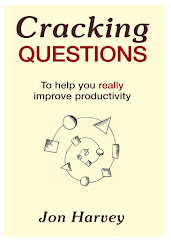Can change be managed or should it, indeed, be led?
Readers of this blog will know that I have titled several posts as 'Change Alchemy' with the
first one explaining why I used this term. Making change stick still seems to me to be a 'daunting mixture of alchemy, tenacity and luck'. On this blog I have sought to outline what are some of the critical ingredients that need to be added to the crucible.
Certainly there are many elements of change leadership that might be reasonably called change management. There are various tasks that need to be manipulated and sequenced, and critical decisions need to be made. But all this seems to be to be more like the project management of change. So change management is a subset of change leadership. The question is, what are the extra ingredients?
I am reminded of an apocryphal comment on someone's professional development review 'not a born leader, yet'. I am pondering whether the ingredients that make change leadership different to change management can be learnt? I hope and believe so - since I am about to craft a workshop entitled 'change leadership'! Here is my starter for ten (and the beginnings of the workshop agenda) of the three most critical ingredients:
Number one for me is passion. Change leaders have and express a passion for where they want to go. This passion is sufficiently infectious and sincere to inspire others to take the journey as well. Change leaders are comfortable with creating visions of the future that are compelling both logically and emotionally. However this passion is not rigid or brittle like cast iron. This passion is strong like an old tree, able to bend in the wind and adapt whilst standing firm.
This heralds a second critical ingredient which must be resilience. Change leadership is rarely easy. I recommend reading 'The Prince' by Niccolò Machaivelli. This quote come comes from the Penguin 1961 edition translated by George Bull:
‘It should be borne in mind that there is nothing more difficult to handle, more doubtful of success, and more dangerous to carry through than initiating changes in a state’s constitution. The innovator makes enemies of all those who prospered under the old order, and only lukewarm support is forthcoming from those who would prosper under the new. Their support is lukewarm partly from fear of their adversaries, who have the existing laws on their side, and partly because men are generally incredulous, never really trusting new things unless they have tested them by experience.’
The Change leader needs to know how to handle resistance and finesse the power of the resistors so that the goal is still achieved.
Thirdly comes being able to make change thrilling but safe. Change is a scary and threatening thing for both leader and those who are on the same journey. Change is always a process of letting go, not just of the past, but also the future. We can allow our past and present to hold us back from trying something new. We can have a fixed idea of the future we think we are going to have. However, ultimately change is about casting off and setting sail to another country. We may look back and think of the years we spent doing 'x' and feel driven to justify it. We may have hunkered down in a cosy image of our future...
But then a change leader comes along with something very different that challenges what we have done (in all good faith) and what we thought we were intent on doing in the future. The change leader will only be successful in these circumstances if they make it safe to change. Recriminations, blame and threats (whether intended or not) have no place in good change leadership. Instead the process of leading change is to create just enough discomfort with the status quo to make people want to change but not so much that fear of the future or justifications of the present way of doing things are provoked to emerge. Not only must the leader make it OK to change, they need to find the balance between comfort and risk.
Perhaps the job of being a change leader is about designing and then operating a rollercoaster!








.jpg)


